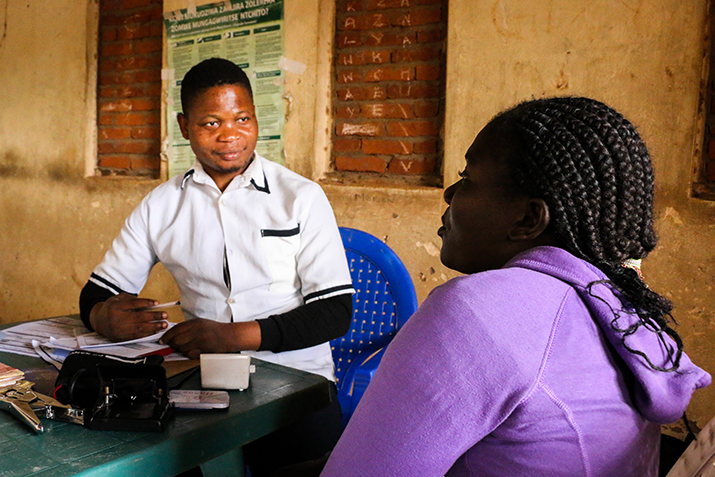Expanding Access to Voluntary Contraception: Changing Women’s Lives in Rural Malawi
Expanding Access to Voluntary Contraception: Changing Women’s Lives in Rural Malawi

![[Linly Mukhwapa, a mother of ten, visited the family planning outreach clinic to learn more about tubal ligation.] {Photo credit: Samy Rakotoniaina}](https://msh.org/wp-content/uploads/2018/10/linly_-_btl._300px_0.png)
Meet Linly, a 35-year-old mother in Mwanyali, a remote village in southern Malawi. Linly says that she has “given birth too often.” She knows that her age and HIV-positive status would make another pregnancy very risky.
“I have decided to stop bearing kids, so that my life is protected.”
Approximately 20% of married women worldwide (225 million women between the ages of 15 and 49) have chosen permanent family planning through tubal ligation — a procedure that severs or blocks the fallopian tubes and is over 99% effective in preventing future pregnancies. But in Malawi, where demand for family planning increased from 50% in 1992 to 78% in 2016, only 8% of women of childbearing age have chosen and received this permanent method. Why are so few women having tubal ligations?
One likely factor is lack of access. Too often, women know that they need to access family planning, but the services aren’t offered, providers aren’t adequately trained, or the health center or hospital is just too far away. Linly chose tubal ligation as the method best suited to her needs, but there was no clinic nearby with providers skilled in performing the procedure. Many centers commonly provide short-term contraceptives (pills and condoms), but long-term methods, particularly those that are permanent, require a specialized skill set that is not as easily accessed. Linly’s experience illustrates why, although the desired family size in Malawi is 3.4 children, the total fertility rate is 4.4 children — meaning that women, on average, are having more pregnancies than they ideally would want. How can countries like Malawi fill the unmet need for long-term family planning in a way that supports vulnerable and hard-to-reach women like Linly?
“Most of the services were accessed from far away clinics, and often we had no transport.”
Mobile outreach clinics, which reduce inequities in access by bringing reproductive health services closer to underserved communities, may be an important part of the solution. These clinics tackle both supply and demand by engaging with communities, coordinating with local leaders, providing counseling to those who need it, and offering a wide range of contraceptive methods to help couples effectively delay, time, space, and limit pregnancies based on their own family planning goals.
It was a mobile outreach clinic, organized by USAID’s Organized Network of Services for Everyone’s (ONSE) Health Activity, that finally enabled Linly to access her chosen family planning method. Led by Management Sciences for Health, ONSE partners with Banja La Mtsogolo (BLM), the largest nonprofit family planning provider in Malawi, to ensure that women are able to access the full range of short- and long-term family planning options.
![[Collins Nkhulanze, an ONSE outreach zone clinician, leads a group counseling session on family planning methods in Mwanyali, Malawi.] {Photo credit: Samy Rakotoniaina}](https://msh.org/wp-content/uploads/2018/10/2018.07_samy_rakotoniaina_outreach_clinic_mulanje_rhfp_education_2.715px.png)
Each morning at a site where a mobile outreach team is operating, clinicians deliver free family planning services in hard-to-reach communities to women and couples of all ages. In the afternoons, the teams focus on reaching young people and meeting their unique needs. Offering both group education and individual counseling, mobile outreach teams inform women and their partners about all available methods of family planning, empowering them to choose the most appropriate method for their own needs. Over six months, ONSE’s nine mobile outreach teams performed more than 525 voluntary tubal ligations and distributed long-acting reversible contraceptives and short-term methods to almost 40,000 clients.
“The coming of an outreach clinic in the village has been a great thing. Now we can access family planning here in our own village.”
ONSE is also deploying nested providers — clinicians and nurses specializing in long-term family planning methods — to address needs in busy health facilities where there is a high demand for services. In addition to providing services directly, these nested providers mentor and build the capacity of family planning medical staff to provide a wider range of contraceptives and enhance individual and couple counseling. In the first three months of deployment, ONSE’s nested providers performed nearly 200 voluntary tubal ligations and mentored health center staff in performing the procedure. As 68% of women who receive permanent family planning access the service through a government-run health center or hospital (with an additional 23% served through BLM’s network of static clinics and outreaches), this capacity building is critical to ensure sustainable access to long-term and permanent family planning methods in Malawi.
![[A mother receives short-term family planning injectable from the outreach clinic in Mwanyali, Malawi.] {Photo by: Samy Rakotoniaina}](https://msh.org/wp-content/uploads/2018/10/6_2018.07_samy_rakotoniaina_outreach_clinic_mulanje_fp_counseling_and_services_6_715px.png)
Approaches like mobile outreach clinics and nested providers can support Malawi in reaching women who know they need family planning but are unable to access it. MSH and its partners are working closely with the Malawi Ministry of Health to ensure that women like Linly can access their chosen family planning method when and where they need it. Voluntary access to the full range of contraceptive options allows couples and women to choose the timing and spacing of their children. It enables them to exercise their human right to family planning, reduces the number of unintended pregnancies and maternal deaths, and empowers women to make their own decisions about their reproductive health.